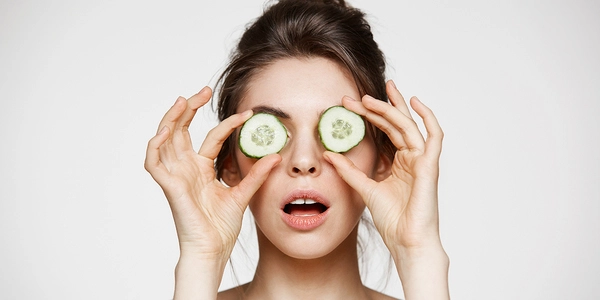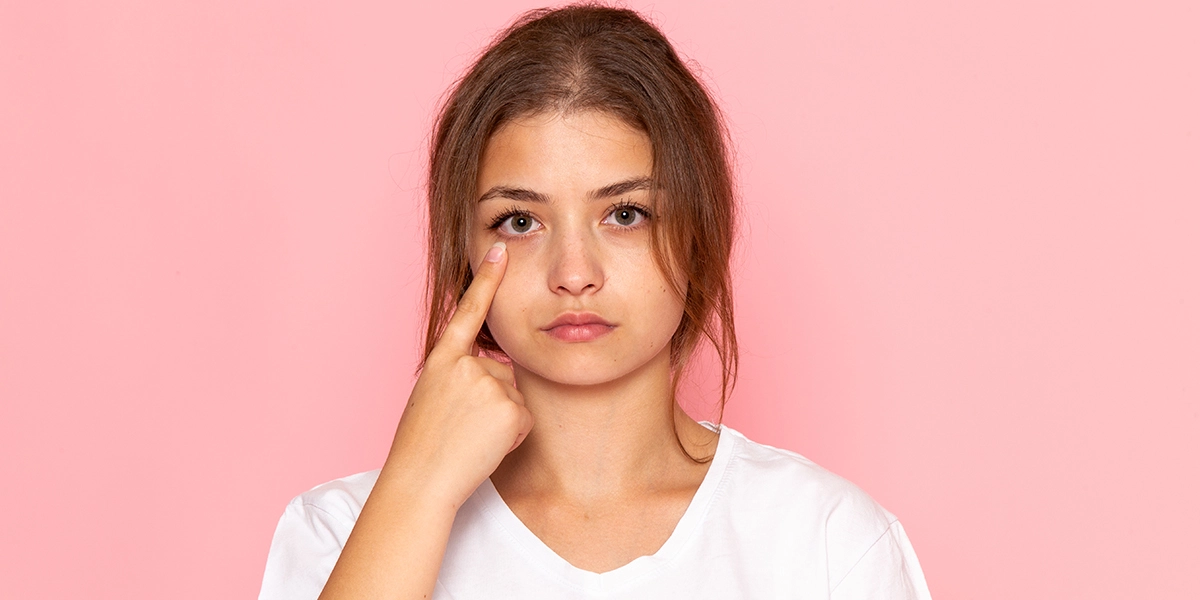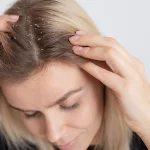Dark Circles Under The Eyes: also known as periorbital dark circles, are the darkened, discolored patches of skin that appear beneath the lower eyelids. They are a common cosmetic concern and can make a person look tired, aged, or unhealthy.
Dark circles can affect people of all ages and genders.
Symptoms: of Dark Circles Under Eyes
Dark circles under the eyes are primarily characterized by the appearance of dark, discolored patches of skin beneath the lower eyelids. These dark patches may vary in color from brown to bluish or purplish, depending on the underlying cause. While the main symptom is the visual appearance of dark circles, there can be some associated symptoms or factors that contribute to their development.
These may include:
- Puffiness or Swelling: Dark circles can sometimes be accompanied by puffiness or swelling in the under-eye area, which can contribute to a tired or aged appearance.
- Fine Lines and Wrinkles: Over time, the skin in the under-eye area may become thinner and more prone to fine lines and wrinkles, adding to the overall appearance of tiredness.
- Itching or Irritation: Allergic reactions or skin irritation can cause itching, redness, and inflammation around the eyes, potentially leading to the development of dark circles.
- Fatigue and Sleepiness: While dark circles themselves may not cause physical sensations, their presence can make a person look tired or sleep-deprived, even if they are well-rested.
- Underlying Medical Conditions: In some cases, dark circles may be a symptom of an underlying medical condition, such as allergies, anemia, thyroid disorders, or sinus congestion. Other symptoms related to these conditions may also be present.
- Sensitivity to Light: People with certain medical conditions that contribute to dark circles may also experience sensitivity to light, eye discomfort, or vision issues.
- Skin Dryness: Dry skin in the under-eye area can accentuate the appearance of dark circles and make the skin look dull.
- Diet and Hydration Issues: Poor diet and inadequate hydration can affect the overall health of the skin, potentially contributing to the development of dark circles.
It’s important to note that the severity of dark circles can vary widely among individuals, and the underlying causes can be different. If you’re concerned about persistent or bothersome dark circles, it’s a good idea to consult with a dermatologist or healthcare professional for proper evaluation and guidance on potential treatments or lifestyle changes.
Causes: of Dark Circles Under Eyes
Dark circles under the eyes can be caused by a variety of factors, both lifestyle-related and medical. The appearance of dark circles is often influenced by a combination of these factors.
Some common causes include:
- Genetics: A family history of dark circles can make you more prone to developing them.
- Thin Skin: The skin under the eyes is thinner and more delicate, making blood vessels and underlying structures more visible.
- Blood Vessel Congestion: Blood vessels around the eyes can become dilated and engorged, leading to a bluish or purplish appearance.
- Pigmentation Issues: Excess melanin production in the skin under the eyes can lead to dark discoloration.
- Allergies: Allergic reactions can cause inflammation and blood vessel dilation, contributing to dark circles.
- Sleep Deprivation: Lack of sleep can cause blood vessels to expand and become more visible, giving a darker appearance.
- Aging: As you age, the skin’s collagen and fat levels decrease, making blood vessels more prominent and skin thinner.
- Dehydration: Insufficient water intake can make the skin appear dull and emphasize dark circles.
- Sun Exposure: Excessive sun exposure can increase pigmentation and darken the skin under the eyes.
- Poor Nutrition: A diet lacking in essential nutrients like vitamin K, vitamin C, and iron can contribute to the development of dark circles.
- Rubbing or Scratching: Constant rubbing or scratching of the delicate skin around the eyes can cause irritation and inflammation.
- Medical Conditions: Underlying health issues such as anemia, thyroid disorders, sinus congestion, and certain medical conditions can contribute to the appearance of dark circles.
- Heredity: Some people are genetically predisposed to having thinner skin and a greater tendency to develop dark circles.
- Smoking and Alcohol: Smoking and excessive alcohol consumption can lead to poor circulation and skin discoloration.
- Fluid Retention: Fluid retention due to factors like allergies, hormonal changes, or high salt intake can lead to puffiness and dark circles.
- Contact Dermatitis: Skin reactions to certain cosmetics or skincare products can cause skin discoloration.
- Sleep Position: Sleeping on your stomach or side can lead to fluid pooling under the eyes, causing puffiness and dark circles.
It’s important to identify the underlying cause of your dark circles in order to determine the most appropriate treatment or lifestyle changes. If you’re concerned about persistent or severe dark circles, consider consulting with a dermatologist or healthcare professional for a proper evaluation and guidance.
Remedies: of Dark Circles Under Eyes
There are several remedies and lifestyle changes that you can try to help reduce the appearance of dark circles under your eyes. Keep in mind that the effectiveness of these remedies can vary depending on the underlying cause of your dark circles.
Here are some options to consider:
- Get Adequate Sleep: Ensuring you get enough quality sleep (typically 7-9 hours for adults) can help reduce puffiness and improve the appearance of dark circles caused by sleep deprivation.
- Stay Hydrated: Drink plenty of water throughout the day to maintain good skin hydration and overall health.
- Healthy Diet: Consume a balanced diet rich in nutrients, including vitamin K, vitamin C, and iron. These nutrients can support skin health and reduce the appearance of dark circles.
- Cold Compresses: Applying cold compresses or chilled tea bags to the under-eye area for about 15 minutes can help reduce swelling and constrict blood vessels.
- Cucumber Slices: Placing thin cucumber slices over your closed eyelids for 10-15 minutes can have a soothing and cooling effect on the skin.
- Topical Creams: Look for creams or serums containing ingredients like retinol, vitamin K, hyaluronic acid, and vitamin C, which may help improve skin texture and reduce pigmentation.
- Sun Protection: Use sunscreen and wear sunglasses to protect your skin from the harmful effects of sun exposure.
- Allergy Management: If allergies contribute to your dark circles, manage your allergies with appropriate medications and avoid allergens whenever possible.
- Avoid Rubbing: Refrain from rubbing or scratching the delicate skin around your eyes to prevent irritation and inflammation.
- Cosmetic Concealers: Makeup products like concealers and color correctors can provide temporary coverage for dark circles.
- Good Skincare Routine: Follow a gentle skincare routine that includes cleansing, moisturizing, and using eye creams to nourish the delicate under-eye area.
- Elevate Your Head While Sleeping: Using an extra pillow or elevating the head of your bed can help prevent fluid accumulation under your eyes.
- Reduce Salt Intake: High salt intake can lead to fluid retention, so try to reduce your sodium consumption.
- Quit Smoking and Limit Alcohol: Smoking and excessive alcohol consumption can contribute to poor circulation and exacerbate dark circles.
- Hygiene Practices: Remove makeup before bed and avoid using harsh or irritating skincare products.
- Medical Treatments: In some cases, medical interventions like chemical peels, laser therapy, microneedling, or injectable fillers can be considered for more significant improvement.
It’s important to note that results from home remedies may take time and consistency. If your dark circles are persistent, severe, or causing you significant concern, consult a dermatologist or healthcare professional for proper evaluation and guidance on the most suitable treatment options for your specific situation.
Prevention: of Dark Circles Under Eyes
While it may not always be possible to completely prevent dark circles under the eyes, you can take several steps to minimize their development and reduce their severity.
Here are some preventive measures you can consider:
- Get Sufficient Sleep: Aim for 7-9 hours of quality sleep per night to help prevent the appearance of dark circles caused by sleep deprivation.
- Stay Hydrated: Drink an adequate amount of water throughout the day to keep your skin hydrated and healthy.
- Maintain a Balanced Diet: Consume a nutritious diet rich in fruits, vegetables, whole grains, lean proteins, and essential nutrients like vitamin K, vitamin C, and iron.
- Protect Your Skin from Sun Exposure: Wear sunscreen with a broad spectrum SPF of at least 30 and protect your eyes from the sun by wearing sunglasses and a wide-brimmed hat.
- Manage Allergies: If you have allergies, work with a healthcare professional to manage them effectively and reduce the risk of inflammation and puffiness.
- Practice Gentle Skincare: Use a mild cleanser and moisturizer suitable for your skin type. Be gentle when applying and removing makeup.
- Limit Salt Intake: Excess salt can lead to fluid retention, so try to reduce your sodium consumption.
- Quit Smoking and Limit Alcohol: Smoking and excessive alcohol consumption can negatively affect your skin’s health and contribute to dark circles.
- Avoid Rubbing Your Eyes: Refrain from rubbing or scratching the delicate skin around your eyes to prevent irritation and inflammation.
- Use a Good Eye Cream: Choose an eye cream that contains ingredients like retinol, hyaluronic acid, vitamin K, and vitamin C to support skin health.
- Practice Stress Management: Chronic stress can affect your sleep patterns and overall well-being, potentially contributing to dark circles.
- Elevate Your Head While Sleeping: Using an extra pillow or raising the head of your bed slightly can help prevent fluid accumulation under your eyes.
- Stay Active: Regular physical activity can help improve circulation and promote overall skin health.
- Practice Proper Makeup Removal: Be diligent about removing makeup before bed to prevent skin irritation and inflammation.
- Stay Hygienic: Practice good hygiene to prevent eye infections or skin issues that might contribute to dark circles.
- Consult a Professional: If you notice persistent or worsening dark circles despite preventive measures, consult a dermatologist or healthcare professional for guidance and potential treatments.
Remember that individual factors, such as genetics and age, can play a role in the development of dark circles. By adopting a healthy lifestyle and skincare routine, you can take proactive steps to reduce the likelihood of dark circles and promote overall skin health.

Heart Attack: Types, Symptoms & Prevention
Eye Infections: Symptoms, Causes & Treatment
Vertigo: Causes, Symptoms, Treatment & Preventive
Hair Loss, Types, Symptoms, Prevention & Treatments
Knee Pain, Symptoms, Types & Self Management
Headaches: Details, Types, Causes, Symptoms & Treatment
Obesity: Definition, Types, Prevention & Treatment
Read this Article Also:- Different Types of Pink Eye | Causes and Symptoms of Pink Eye
If you don’t like this article/post please share your feedback.





